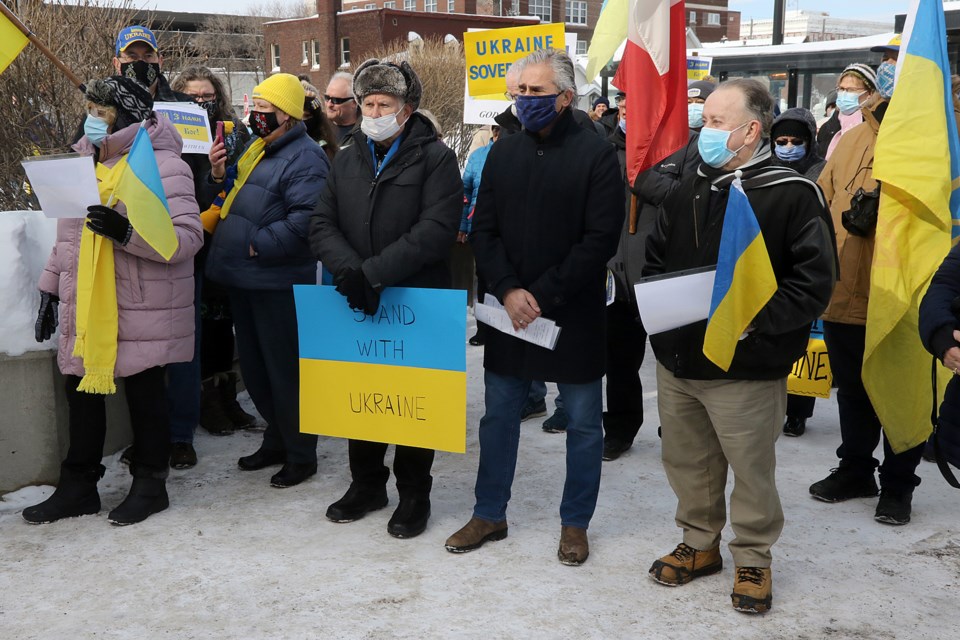THUNDER BAY – Thunder Bay Mayor Bill Mauro sees a role for the city in accommodating those fleeing the Russian invasion of Ukraine, thanks in large part to the community’s significant existing Ukrainian population.
On Monday, the mayor will ask city council to approve a resolution asking the federal government to identify Thunder Bay as “an ideal location for settlement of Ukrainian refugees.”
The resolution also calls for peace, expresses support for sanctions imposed against Russia, and urges the federal government to “welcome those fleeing the conflict with Ukraine into our country with open arms.”
If passed, a copy would be sent to local MPs Patty Hajdu and Marcus Powlowski, the prime minister, and the ministers of foreign affairs and immigration.
“Council should stand with the people of Ukraine, Ukrainian communities across Ontario, and those around the world in strongly condemning this brazen and unprovoked attack,” the resolution reads.
Mauro said the situation also presents a potential “opportunity” for the city, saying Ukrainians would make a welcome addition to a community struggling with a stagnant population and youth out-migration.
“Like many northern and rural communities in Canada, we have trouble with population growth, and… maintaining new immigrant communities, because unless when they come, they find their culture reflected in the community, it’s hard to retain them.”
“Here in Thunder Bay, we have all of those pieces when it comes to the Ukrainian community,” he said. "The language is here, their culture, their food, their music, their religion. All of those things are very important to people.”
The 2016 census indicated there are more than 14,000 Thunder Bay residents identifying as having Ukrainian heritage, he noted.
It remains uncertain, however, whether Canada will see a large influx of people displaced by Russia's invasion.
The Thunder Bay Multicultural Association, which helps resettle refugees in the area, said the large majority of those fleeing Ukraine – a figure that climbed above one million people Thursday, according to the United Nations – will likely remain in neighbouring countries like Poland, Slovakia, Hungary, and Moldova for the time being.
“This is a tragic and horrifying situation to watch unfold,” said executive director Cathy Woodbeck. “As a refugee resettlement agency, we wait to hear what the next steps may be for those fleeing Ukraine and what role Canada will play in that.”
“If Canada receives Ukrainian refugees, as a refugee resettlement agency we would facilitate the arrivals that get destined to Thunder Bay. At this point we have not heard that it is a refugee movement. We have to wait and see.”
Woodbeck pointed to similar comments made by Canada’s representative to the United Nations High Commission for Refugees (the UNHCR).
"We're talking really, really early days for resettlement," Rema Jamous told the Canadian Press earlier this week. "People will always want to go home before they think about going anywhere else."
The UNHCR has estimated there could soon be as many as four million Ukrainians displaced outside of the country, along with up to 12 million people in Ukraine who will also need relief.
Mauro said he’d reached out to the multicultural association and members of the local Ukrainian community before crafting his resolution.
“Through this work, I’m just trying to be a bit of a coordinator, and trying to get those who can really do the tangible, hands-on work to be as prepared as possible.”
He wasn’t keen to see the city’s support extend to a financial commitment, however.
“I don’t think we’ve done that in the past,” he said. “I don’t think that’s really part of the discussion. The federal government has responsibility for this, primarily, [and] multicultural associations are funded to try to carry this forward.”
At least a handful of municipalities, including Brantford and Woolwich Township, in the Waterloo region, have donated money to groups supporting the displaced, each contributing $10,000.
Many more have passed symbolic resolutions of support, while others have looked at procurement policies to ensure they aren’t contracting with Russian companies.
Walter Warywoda, president of the local branch of the League of Ukrainian Canadians, said it wasn’t his place to comment on what the city should do, but welcomed the support.
“It’s going to take a village to make this happen,” he said.
More importantly, he said, he wants to see the federal government truly fast-track immigration applications from Ukrainians.
Warywoda said Thursday his efforts to sponsor Ukrainian family members of his own who are currently in Poland had so far still followed the typical process, which he described as lengthy and involved.
NDP leader Jagmeet Singh has called on the government to temporarily allow Ukrainians to come into Canada without a visa, given the gravity of the situation, an idea also floated by the Canadian Council for Refugees.
Immigration Minister Sean Fraser said Thursday waiving visa requirements is a complex solution that would take up to 14 weeks to implement, and raised concerns that without background checks, some people aligned with Russian forces could “slip through the cracks.”
Instead, the government has announced steps including a new emergency visa category, which will waive fees and allow an unlimited number of Ukrainians to come to Canada for up to two years, prioritizing immigration applications for Ukrainians, launching a dedicated phone line for those with “urgent Ukraine-related immigration questions,” and expediting permanent residency applications for Ukrainians with family in Canada.
Ontario Labour Minister Monte McNaughton, meanwhile, suggested employers and unions in the province have stepped up to offer what could amount to tens of thousands of employment opportunities for Ukrainians when they arrive.
That will be key, said Warywoda, who said Ukrainians who do arrive here are likely to be skilled and will be ready to contribute to their communities, but will need support to make the transition.
